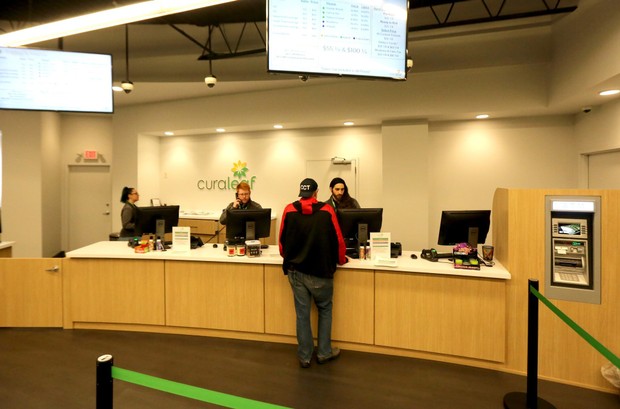Fresh out of prison, the marijuana activist who calls himself “NJWeedman” says he’ll oppose the state’s push toward legal weed unless the rules are changed to guarantee African-American and Latino entrepreneurs a bigger share of the market.
Ed Forchion joins a growing cadre of pro-marijuana activists in New Jersey who are advocating for minorities to have a significant share of what could be a $1 billion market in growing, distributing and selling legal weed.
With some black lawmakers opposed to legal sales, the state’s path toward legalization may run through African-American activists and entrepreneurs like Forchion and Leo Bridgewater, an Army veteran who heads the state chapter of Minorities for Medical Marijuana.
The two men, both New Jersey natives who returned to their home state after years elsewhere, represent two faces of New Jersey’s marijuana debate. Forchion, 54, with dreadlocks and shirts printed with pot leaves, is the flamboyant activist who spent a total of four years in prison on charges stemming from marijuana arrests, and rails against politicians. Bridgewater, 43, with close-cropped hair and business suits, speaks with Gov. Phil Murphy and addresses conferences attended by predominantly white entrepreneurs.
Yet their views converge on the issue of an African-American and Latino buy-in to a future marijuana market. Both agree that the current legalization bill — which stipulates that the state should make “good faith” efforts to ensure minority participation — doesn’t go far enough. The bill, by Sen. Nicholas Scutari, D-Union, says the state should benchmark the number of minority- and female-owned marijuana businesses against the number of minority- and female-owned businesses overall in each county.
“It’s a multibillion-dollar industry that Senator Scutari is putting together and he is legislatively excluding minorities, and it’s deliberate,” Forchion said. “I hope people will continue to buy from the street. There’s plenty of good marijuana on the street.”
He said the bill’s thicket of regulations — which could exclude owners with criminal histories and make opening a store a $100,000 proposition — would limit the marketplace to people with financial resources, shutting out many people of color. He also said that by not allowing people to grow their own marijuana at home, the bill ensures that the marketplace will be dominated by large businesses.
Scutari, who has said current marijuana laws lead to disproportionate numbers of arrests of black men, revised his bill to ensure more minority participation in a marijuana marketplace. The new version sets aside 25 percent of marijuana business licenses for residents of economically distressed areas that have suffered the consequences of the drug war.
“It’s the right thing to do, to give people an opportunity who live in areas that have been disproportionately affected,” Scutari said.
Forchion and Bridgewater aren’t sold. Bridgewater said the revised bill’s “impact zone” set-aside doesn’t guarantee that African-American and Latino entrepreneurs would get a proportionate share of the market.
“No way did they get themselves educated and come up with this idea,” Bridgewater said.
While arguing that Forchion’s in-your-face style may alienate allies, Bridgewater said Weedman is right on his broader point. Bridgewater said Scutari’s bill would give white men — who account for about 27 percent of New Jersey’s population — 85 percent of the state’s legal weed business.
“As of right now, on its face, Ed is right,” Bridgewater said. “The problem with the bill is that they’re not talking to the very demographic they say they’re setting up the program for. For me, 15 percent is an insult to all black people in New Jersey.”
Bridgewater spoke at a marijuana business conference at Trenton’s War Memorial, while a couple of hundred feet away, Forchion gathered signatures on a petition to run for a Trenton-area seat in the state Assembly. He kept two marijuana cigarettes in the clipboard with his petition papers. Forchion, who has run for several political offices but never won, plans to run in November as neither a Democrat nor a Republican.
Forchion said that when he started publicly advocating for legal marijuana in the late 1990s, the reaction was usually middle fingers and threats. Now, people take selfies with him and ask to share joints.
“I was a zero then,” he said. “I’m a hero now. Things have changed a lot.”
He was released from prison May 24 after 14 months in a case that stemmed from an investigation of his Trenton restaurant, NJWeedman’s Joint, that police suspected as a hub for drug sales. Prosecutors charged Forchion with witness tampering for alleged threats he made against a confidential informant who had helped police.
Forchion was in prison when Murphy was elected after vowing to legalize marijuana in New Jersey. And he remained behind bars as a buzz of activity developed around the potential for a legal market, with the state taking center stage at cannabis industry conferences around the East Coast.
Credit: www.northjersey.com



